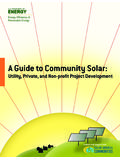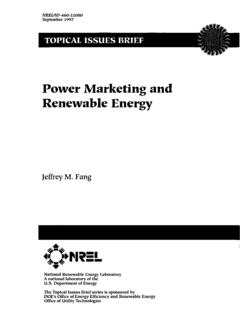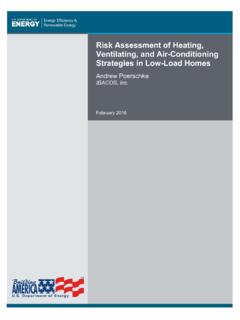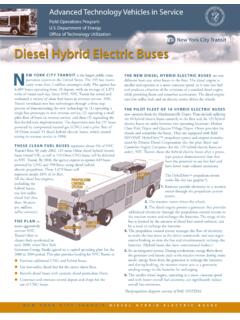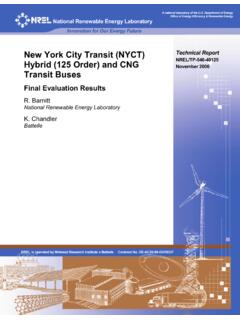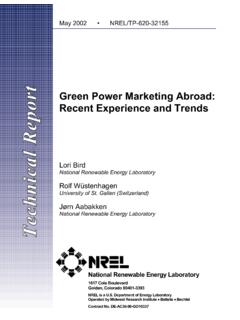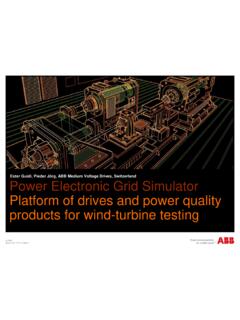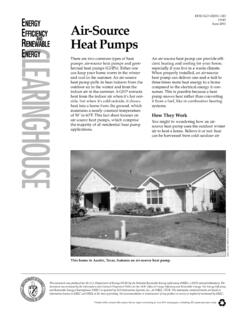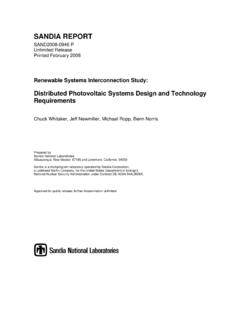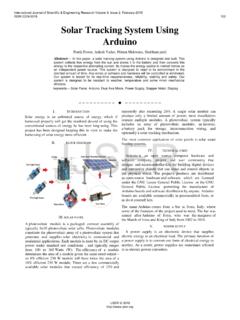Transcription of Land-Use Requirements for Solar Power Plants in the United ...
1 NREL is a national laboratory of the Department of energy Office of energy Efficiency & Renewable energy Operated by the Alliance for Sustainable energy , LLC. This report is available at no cost from the National Renewable energy Laboratory (NREL) at Contract No. DE-AC36-08GO28308 Land-Use Requirements for Solar Power Plants in the United States Sean Ong, Clinton Campbell, Paul Denholm, Robert Margolis, and Garvin Heath Technical Report NREL/TP-6A20-56290 June 2013 NREL is a national laboratory of the Department of energy Office of energy Efficiency & Renewable energy Operated by the Alliance for Sustainable energy , LLC. This report is available at no cost from the National Renewable energy Laboratory (NREL) at Contract No. DE-AC36-08GO28308 National Renewable energy Laboratory 15013 Denver West Parkway Golden, CO 80401 303-275-3000 Land-Use Requirements for Solar Power Plants in the United States Sean Ong, Clinton Campbell, Paul Denholm, Robert Margolis, and Garvin Heath Prepared under Task Nos.
2 And Technical Report NREL/TP-6A20-56290 June 2013 NOTICE This report was prepared as an account of work sponsored by an agency of the United States government. Neither the United States government nor any agency thereof, nor any of their employees, makes any warranty, express or implied, or assumes any legal liability or responsibility for the accuracy, completeness, or usefulness of any information, apparatus, product, or process disclosed, or represents that its use would not infringe privately owned rights. Reference herein to any specific commercial product, process, or service by trade name, trademark, manufacturer, or otherwise does not necessarily constitute or imply its endorsement, recommendation, or favoring by the United States government or any agency thereof. The views and opinions of authors expressed herein do not necessarily state or reflect those of the United States government or any agency thereof.
3 This report is available at no cost from the National Renewable energy Laboratory (NREL) at Available electronically at Available for a processing fee to Department of energy and its contractors, in paper, from: Department of energy Office of Scientific and Technical Information Box 62 Oak Ridge, TN 37831-0062 phone: fax: email: Available for sale to the public, in paper, from: Department of Commerce National Technical Information Service 5285 Port Royal Road Springfield, VA 22161 phone: fax: email: online ordering: Cover Photos: (left to right) photo by Pat Corkery, NREL 16416, photo from SunEdison, NREL 17423, photo by Pat Corkery, NREL 16560, photo by Dennis Schroeder, NREL 17613, photo by Dean Armstrong, NREL 17436, photo by Pat Corkery, NREL 17721. Printed on paper containing at least 50% wastepaper, including 10% post consumer waste. iii This report is available at no cost from the National Renewable energy Laboratory (NREL) at Acknowledgments This work was made possible by the Solar energy Technologies Program at the Department of energy (DOE).
4 The authors wish to thank Billy Roberts, Jarett Zuboy, Trieu Mai, Nate Blair, Robin Newmark, Margaret Mann, Craig Turchi, Mark Mehos, and Jim Leyshon of the National Renewable energy Laboratory (NREL) for contributing to and reviewing various versions of the document, as well as Karen Smith, Rob Horner, Corrie Clark of Argonne National Laboratory for their thoughtful reviews. The authors also thank Mary Lukkonen of NREL s Communications Office for a thorough technical edit of the document. iv This report is available at no cost from the National Renewable energy Laboratory (NREL) at Executive Summary By the third quarter of 2012, the United States had deployed more than gigawatts (GWac1) of utility-scale Solar generation capacity, with GWac under construction as of August 2012 (SEIA 2012). Continued growth is anticipated owing to state renewable portfolio standards and decreasing system costs (DOE 2012a).
5 One concern regarding large-scale deployment of Solar energy is its potentially significant land use. Efforts have been made to understand Solar land use estimates from the literature (Horner and Clark 2013); however, we were unable to find a comprehensive evaluation of Solar land use Requirements from the research literature. This report provides data and analysis of the land use associated with utility-scale2 ground-mounted photovoltaic (PV) and concentrating Solar Power (CSP) facilities. After discussing Solar Land-Use metrics and our data-collection and analysis methods, we present total and direct Land-Use results for various Solar technologies and system configurations, on both a capacity and an electricity-generation basis. The total area corresponds to all land enclosed by the site boundary. The direct area comprises land directly occupied by Solar arrays, access roads, substations, service buildings, and other infrastructure.
6 We quantify and summarize the area impacted, recognizing that the quality and duration of the impact must be evaluated on a case-by-case basis. As of the third quarter of 2012, the Solar projects we analyze represent 72% of installed and under-construction utility-scale PV and CSP capacity in the United States. Table ES-1 summarizes our Land-Use results. 1 All capacity-based Land-Use intensity figures in this study are expressed in terms of MWac or GWac. This is to maintain consistency within the paper because CSP Power Plants are rated in terms of MWac. The conversion factor between dc-rating and ac-rating is discussed in Section 3. 2 We define utility-scale as greater than 1 MWdc for PV Plants and greater than 1 MWac for CSP Plants . v This report is available at no cost from the National Renewable energy Laboratory (NREL) at Table ES-1. Summary of Land-Use Requirements for PV and CSP Projects in the United States Technology Direct Area Total Area Capacity-weighted average land use (acres/MWac) Generation-weighted average land use (acres/GWh/yr) Capacity-weighted average land use (acres/MWac) Generation-weighted average land use (acres/GWh/yr) Small PV (>1 MW, <20 MW) Fixed 1- axis 2- axis flat panel 13 2- axis CPV Large PV (>20 MW) Fixed 1-axis 2-axis CPV CSP 10 Parabolic trough Tower 10 Dish Stirling 10 Linear Fresnel We found total Land-Use Requirements for Solar Power Plants to have a wide range across technologies.
7 Generation-weighted averages for total area Requirements range from about 3 acres/GWh/yr for CSP towers and CPV installations to acres/GWh/yr for small 2-axis flat panel PV Power Plants . Across all Solar technologies, the total area generation-weighted average is acres/GWh/yr with 40% of Power Plants within 3 and 4 acres/GWh/yr. For direct-area Requirements the generation-weighted average is acres/GWh/yr, with 49% of Power Plants within and acres/GWh/yr. On a capacity basis, the total-area capacity-weighted average is acres/MWac, with 22% of Power Plants within 8 and 10 acres/MWac. For direct Land-Use Requirements , the capacity-weighted average is acre/MWac, with 40% of Power Plants within 6 and 8 acres/MWac. Other published estimates of Solar direct land use generally fall within these ranges. Both capacity- and generation-based Solar Land-Use Requirements have wide and often skewed distributions that are not well captured when reporting average or median values.
8 S ome Solar categories have relatively small samples sizes, and the highest-quality data are not available for all Solar projects; both of these factors must be considered when interpreting the robustness of reported results. Owing to the rapid evolution of Solar technologies, as well as Land-Use practices and regulations, the results reported here reflect past performance and not necessarily future trends. Future analyses could include evaluating the quality and duration of Solar Land-Use impacts and using larger sample sizes and additional data elements to enable a thorough investigation of additional Land-Use factors. vi This report is available at no cost from the National Renewable energy Laboratory (NREL) at Table of Contents 1 Introduction .. 1 2 Solar Power Plant Land-Use Metrics .. 2 3 Solar Land-Use Data and Methodology .. 4 4 Results .. 6 Summary Results .. 7 PV Land-Use Results .. 9 Evaluation of PV Packing Factors.
9 12 Impact of Location and Tracking Configuration on PV Land Use .. 13 CSP Land-Use Results .. 15 5 Conclusions .. 17 References .. 20 Appendix A. CSP Solar Multiple Ranges .. 22 Appendix B. PV Projects Evaluated .. 24 Appendix C. CSP Projects Evaluated .. 32 Appendix D. Impact of PV system Size and Module Efficiency on Land-Use Requirements .. 34 Appendix E. Impact of CSP system Size and Storage on Land-Use Requirements .. 37 vii This report is available at no cost from the National Renewable energy Laboratory (NREL) at List of Figures Figure 1. NREL mesa top PV system example of direct and total land use .. 3 Figure 2. Map of PV and CSP installations evaluated .. 7 Figure 3. Distribution of Solar Land-Use Requirements whiskers indicate maximum and minimum values, box indicates 75th (top of box) and 25th (bottom of box) percentile estimates .. 8 Figure 4. Distribution of generation-based Solar Land-Use Requirements whiskers indicate maximum and minimum values, box indicates 75th (top of box) and 25th (bottom of box) percentile estimates.
10 Blue dot represents eSolar s Sierra Sun Tower (10 acres/GWh/yr), separated for clarity (but not considered an outlier) .. 9 Figure 5. Distribution of small PV Land-Use Requirements whiskers indicate maximum and minimum values, box indicates 75th (top of box) and 25th (bottom of box) percentile estimates .. 11 Figure 6. Distribution of large PV Land-Use Requirements whiskers indicate maximum and minimum values, box indicates 75th (top of box) and 25th (bottom of box) percentile estimates .. 12 Figure 7. Capacity-weighted average packing factor for PV projects evaluated whiskers indicate maximum and minimum values, box indicates 75th (top of box) and 25th (bottom of box) percentile estimates .. 13 Figure 8. Modeled data showing relationship between CSP thermal storage and Land-Use intensity .. 16 Figure D-1. Total-area Requirements for small PV installations as a function of PV plant size .. 34 Figure D-2. Total-area Requirements for large PV installations as a function of PV plant size.
